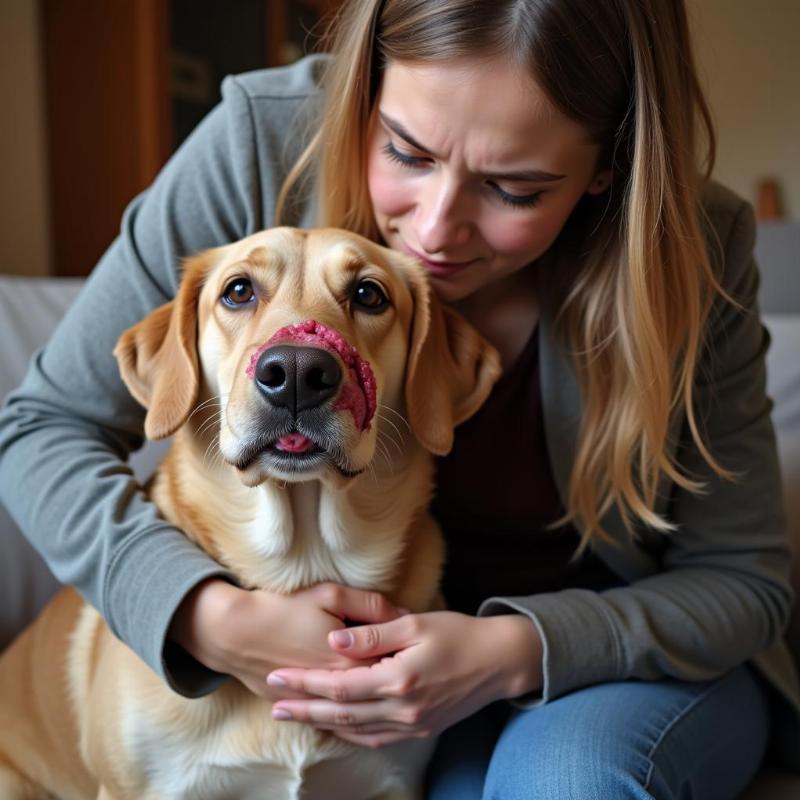If your dog was bitten by a raccoon, you need to act quickly. Raccoon bites are serious and can transmit diseases like rabies. This article provides a comprehensive guide for US dog owners on what to do if their dog is bitten by a raccoon, covering essential first aid, veterinary care, and preventive measures.
First, ensure your safety. Do not approach the raccoon. If it’s still present, try to scare it away without putting yourself at risk. Once the raccoon is gone, carefully restrain your dog to prevent further injury.
Immediate Actions After a Raccoon Bite
After ensuring your safety and restraining your dog, follow these crucial steps:
- Control the Bleeding: Apply direct pressure to the wound using a clean cloth. If bleeding is profuse, elevate the affected area.
- Clean the Wound: Gently wash the wound with mild soap and warm water. Avoid using hydrogen peroxide or alcohol, as these can damage the tissue. Rinse thoroughly.
- Contact Your Veterinarian: Even if the bite seems minor, a raccoon bite requires immediate veterinary attention due to the risk of rabies and other infections.
 Chó bị gấu trúc cắn
Chó bị gấu trúc cắn
Veterinary Care for Raccoon Bites
Your veterinarian will likely conduct a thorough examination of the wound and may recommend the following:
- Rabies Vaccination/Booster: Depending on your dog’s vaccination history, a rabies booster may be necessary. In some cases, post-exposure prophylaxis may be required. This is especially crucial as rabies can be fatal.
- Antibiotics: To prevent bacterial infections that are common with raccoon bites, your vet will likely prescribe antibiotics.
- Wound Management: Depending on the severity of the bite, stitches, drains, or bandaging may be necessary.
- Pain Management: Your vet may prescribe pain medication to keep your dog comfortable during recovery.
The Dangers of Raccoon Bites: Rabies and Other Infections
Raccoon bites pose significant health risks to dogs, primarily due to the possibility of rabies transmission. Rabies is a deadly viral disease that affects the central nervous system. Other potential infections include:
- Bacterial Infections: Raccoon mouths harbor various bacteria that can cause infections in bite wounds.
- Leptospirosis: A bacterial disease that can cause kidney and liver damage.
- Roundworm: Raccoons can carry roundworm parasites that can be transmitted to dogs.
Preventing Raccoon Encounters
Taking preventive measures can significantly reduce the risk of raccoon encounters:
- Secure Trash Cans: Raccoons are attracted to garbage. Use tightly sealed containers and store them in a secure location.
- Remove Food Sources: Don’t leave pet food or other food items outdoors.
- Supervise Your Dog: When outdoors, especially at night, keep your dog on a leash and supervise them closely.
- Fence Your Yard: A secure fence can help deter raccoons from entering your property. Consider installing motion-activated sprinklers or lights as an added deterrent.
What to Do if You See a Raccoon in Your Yard
If you spot a raccoon in your yard, avoid approaching it. Make loud noises to scare it away. If the raccoon appears sick or aggressive, contact your local animal control or wildlife authorities.
Conclusion
A raccoon bite is a serious matter that requires prompt action. By understanding the risks, taking immediate action, seeking veterinary care, and implementing preventive measures, you can protect your furry friend from the dangers of raccoon encounters. Remember, early intervention and proper veterinary care are key to a successful recovery.
FAQ
- What should I do if I can’t get to a vet immediately after a raccoon bite? Clean the wound thoroughly and control the bleeding. Contact your vet and explain the situation; they’ll advise on the next best steps.
- How can I tell if a raccoon has rabies? It’s difficult to tell just by looking. Raccoons with rabies may exhibit unusual behavior, such as aggression, disorientation, or excessive drooling. However, any raccoon bite should be treated as a potential rabies exposure.
- Can my dog get rabies even if it’s vaccinated? While vaccination significantly reduces the risk, it’s not 100% foolproof. A booster shot after a bite is often recommended.
- Are raccoons more active at certain times of the year? Raccoons are most active during the spring and summer months, particularly at night.
- What are the signs of infection in a dog bite wound? Look for increased redness, swelling, pain, pus, or a foul odor.
- How long does it take for rabies symptoms to appear in a dog? Typically, symptoms appear within 2-8 weeks, but it can take several months.
- Is it safe to have raccoons in my yard? While they are part of the natural ecosystem, they can pose a risk to pets. It’s best to deter them from your property.
Beautdogs.us is your premier online resource for all things dog-related in the US. We offer expert advice on dog breeds, grooming, health, and overall wellness. Whether you’re a seasoned dog owner or just starting your journey with a furry companion, Beautdogs.us provides comprehensive and reliable information to help you navigate the joys and challenges of dog ownership. For inquiries or further assistance, please contact us at [email protected] or call us at +1 501-555-7529. Visit us at Beautdogs.us for more valuable resources.